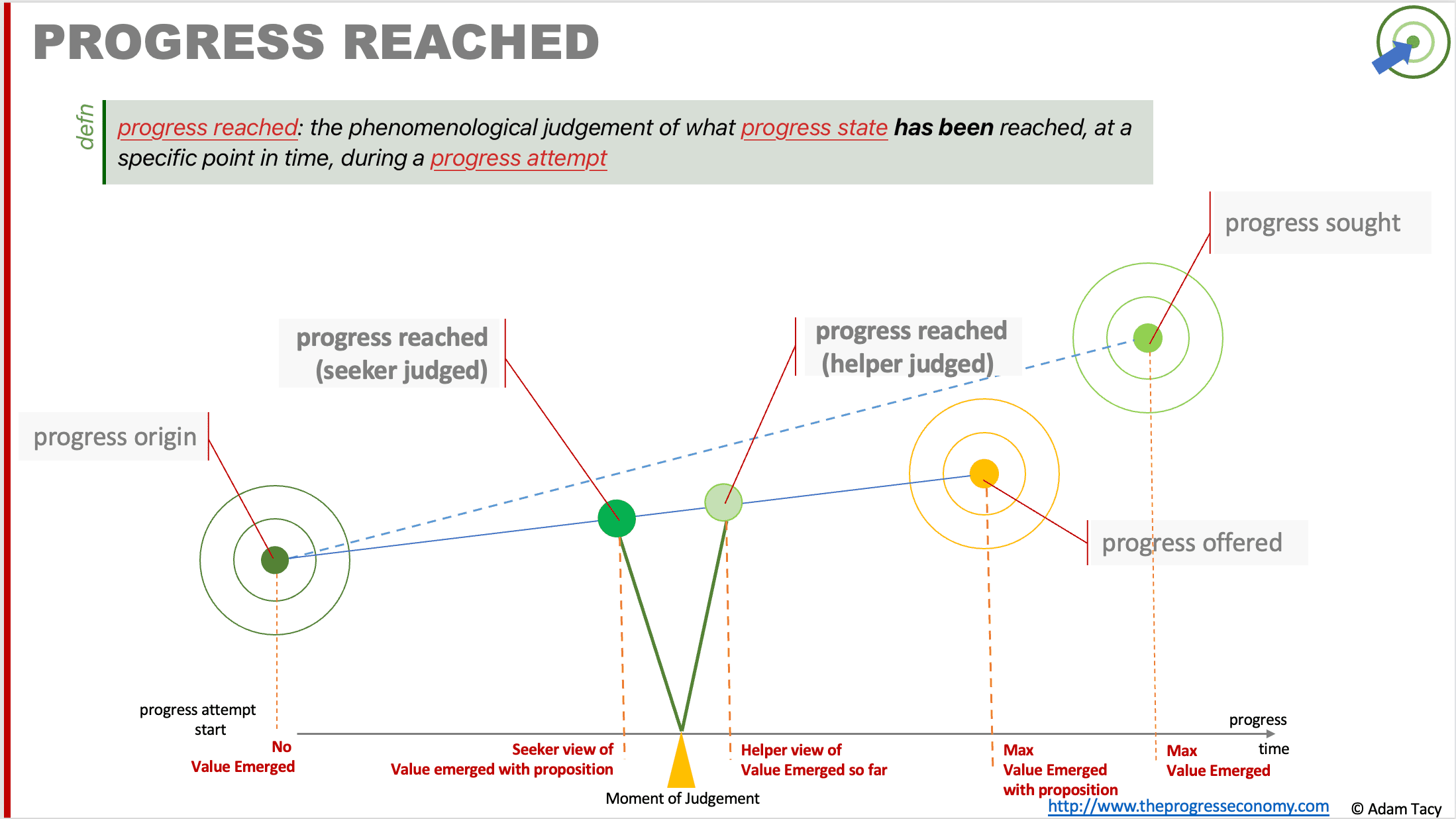What we’re thinking
Progress reached is the progress state that an actor phenomenologically judges to have been reached at a specific point during a progress attempt.
Progress Reached – judgements of progress made during a progress attempt. As value emerges from progress it is also a view of what value has emerged – which may differ from value a seeker has recognised. Share on XThese judgements relate to value in two ways. First it indicates how much value an actor feels has emerged by that point. Secondly, we find that for emerged value to be meaningful to the actor, they need to recognise it (like accountants recognise revenue).
Predominantly it is the seeker that judges progress reached. Though in some cases a helper may in parallel judge progress reached. They may withdraw from helping if they feel progress is being hindered (i.e. value co-destruction is occurring) or try and recover from that co-destruction.
Editing below here
Progress reached
Progress reached is the progress state an actor judges to have been reached at a specific moment during a progress attempt. It is one of the named states in the progress economy, forming a pair of phenomenological judgments alongside progress potential.
progress reached: the phenomenological judgement, at a specific moment in time, of what progress state has been reached during a progress attempt
As viewed by a seeker
Predominantly, the seeker makes these judgments as part of their progress decision process during an progress attempt. Regularly assessing phenomenologically whether they’ve made sufficient progress compared to their expectations, seekers determine whether to continue or abandon the attempt.
A lack of progress might be attributed to insufficient resources, including knowing how to make progress, or one of the five other progress hurdles. Alternatively one of the actors may be missapplying available resources, potentially resulting in value co-destruction.
As viewed by a helper
As we move away from the enabling end of the progress proposition continuum towards relieving propositions, progress helpers drive more of the progress-making activities. They then also tend to assess progress reached with a seeker. Identifying whether to continue offering their resources or ultimately withdraw.
Measuring progress reached
Similar to measuring progress potential, artificial scales and measurements are employed to gauge progress reached due to its complex nature. Three approaches are commonly used:
- Binary Pass/Fail
- Standardised Scales
- Subjective Assessments
- Complex Scoring Mechanisms
For example we “measure” learning through passing levels – like the HSK levels for learning Mandarin Chinese. Or project progress by passing pre-defined milestones. And the softer “how did we do?” via web questionnaires or tapping a green/yellow/red emoji face button after leaving airport security.
Helpers often strive to assist seekers in forming judgments about their progress reached. For instance, they may offer guarantees like “money-back if not satisfied” or establish exams that allow seekers to demonstrate their levels of qualification.
relating to value
We know that there is no value at the outset, at progress origin, and maximum value at the destination, progress sought. Consequently, it stands to reason that value increasingly emerges as progress is made.
Since progress reached represents a judgment of progress achieved, it can also be viewed as a judgment of value, right?
Almost. It certainly serves as an indication of value that has emerged. However, the critical question is whether the value emerged is meaningful to the seeker. And that largely depends on the seeker.
Consider learning Mandarin Chinese. Value emerges with each new word, phrase, grammar construct learnt. And for some seekers that progress is meaningful value. For others value from progress is only meaningful once they complete a level of the HSK proficiency classification.
So whilst value progressively emerges, recognition of that value may occur on a different time schedule. This is analogous with how accountants recognise revenue.
Relating to innovation
The purpose of innovation is naturally to enable the progress seeker to reach further.

Let’s progress together through discussion…